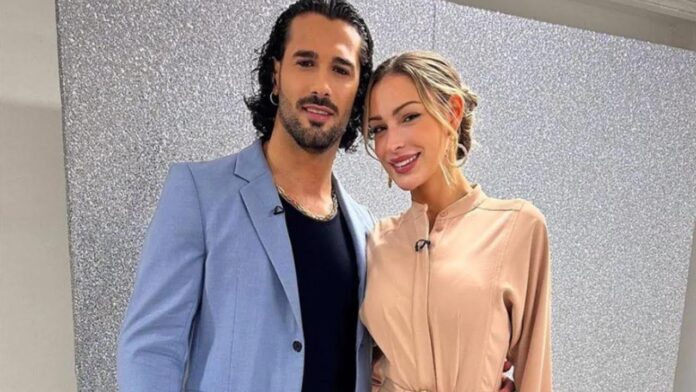Strictly Come Dancing’s Graziano Di Prima accused of abusive behaviour towards Zara McDermott, leading to his removal from the show
Graziano Di Prima’s tenure on Strictly Come Dancing has come to a dramatic end following serious allegations of abusive behaviour towards his partner, Zara McDermott. Reports emerged detailing disturbing incidents during rehearsals, culminating in Di Prima’s removal from the show.
Zara McDermott, known for her stint on Love Island, faced a tumultuous time during rehearsals with Di Prima. Sources reveal that Di Prima, 30, hurled abuse at McDermott, leading her to tears on multiple occasions. The tension escalated to a point where McDermott sought refuge in the rehearsal space’s toilets, only to be followed by Di Prima, who continued his tirade.
The shocking claims come in the wake of Di Prima’s dismissal from the 2024 Strictly lineup, a decision prompted by these allegations. Di Prima admitted to having “kicked” McDermott but denied claims of spitting at her, labelling the incident as a one-off. McDermott, however, refuted this, asserting that the abusive behaviour was persistent.
Additional reports indicate that during a Halloween performance rehearsal, Di Prima questioned McDermott’s weight and harshly criticized her for a minor misstep, resulting in her crying behind the curtain. A source described the scene to The Sun, stating, “She didn’t put her foot in the right direction and he was being forceful with her. She was crying behind the curtain during final rehearsals.”
Despite the turmoil, Di Prima’s representatives have dismissed the allegations as “rumor-mongering” and criticized the media for exacerbating the situation. They highlighted the profound mental health challenges faced by those involved, calling for a more compassionate approach.
The controversy has cast a shadow over the beloved family show. Di Prima’s removal followed similar allegations against another Strictly star, Giovanni Pernice. Pernice’s former partner, Amanda Abbington, accused him of “militant” training methods, which she claimed led to her diagnosis of PTSD. Pernice has vehemently denied these allegations.
The BBC’s investigation into the matter has unearthed a series of disturbing revelations about the show’s behind-the-scenes dynamics. Footage reviewed as part of the probe was instrumental in the decision to axe Di Prima. Additionally, reports suggest that another former Strictly star may be implicated as the investigation continues.
Judge Anton Du Beke, a long-time professional on the show, has also been dragged into the controversy. A historic complaint against him from 2009 has resurfaced amidst the current investigation, further complicating the situation.
As Strictly Come Dancing grapples with these allegations, the show’s future remains uncertain. The BBC’s investigation is ongoing, aiming to address the reported abuses and ensure a safer environment for all participants.
Analysis
Political: The allegations against Graziano Di Prima on Strictly Come Dancing highlight broader issues within high-profile entertainment environments, which can be reflective of workplace culture in other sectors. Politically, the BBC faces scrutiny over how it handles such allegations, balancing public expectations of accountability with internal protocols. The network’s response to the scandal could influence public trust and government support, potentially impacting funding and regulatory oversight. This situation underscores the need for robust policies to address workplace harassment and promote a culture of respect and safety.
Social: Socially, the Strictly Come Dancing scandal resonates with ongoing conversations about workplace harassment and abuse of power. Zara McDermott’s experience, coupled with similar allegations against Giovanni Pernice, sheds light on the challenges faced by women in the entertainment industry. The public outcry and media coverage amplify the #MeToo movement’s message, encouraging other victims to speak out and demand accountability. This incident may prompt other organizations to reassess their own environments and implement stronger measures to protect employees and participants from similar abuse.
Racial: The allegations against Di Prima, who is Sicilian-born, and the diverse cast of Strictly Come Dancing bring racial and cultural dynamics into the spotlight. While the focus remains on abusive behaviour, it’s important to consider how cultural backgrounds and societal expectations might influence interactions and perceptions within such environments. The show’s diverse cast reflects a commitment to inclusivity, but the incidents underscore the necessity for sensitivity training and cultural competence to prevent misunderstandings and ensure respectful treatment for all.
Gender: Gender dynamics are central to the Strictly Come Dancing controversy. The allegations against Di Prima and Pernice highlight the power imbalances that can exist between male professionals and female celebrities. These incidents underscore the need for greater awareness and proactive measures to address gender-based harassment. The entertainment industry, like many others, must prioritize creating a safe and equitable environment where women feel empowered to voice concerns without fear of retaliation. The public response to these allegations may drive further advocacy for gender equality and safety in workplaces.
Economic: Economically, the scandal could have significant repercussions for the Strictly Come Dancing franchise. The BBC may face financial consequences if public trust diminishes and viewership declines as a result of the negative publicity. Additionally, sponsors and advertisers might reconsider their associations with the show, leading to potential revenue losses. On the flip side, the situation presents an opportunity for the BBC to demonstrate leadership by implementing comprehensive reforms and rebuilding its reputation, which could attract new support and investment in the long run.
